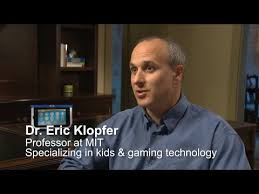
Oradores
Simpósio doutoral
Comissões
Contactos
|
|
Oradores |
| Dr. Eric Klopfer | Resonant Games - Designing educational games that resonate in the lives of students, teachers and schools |
 |
Creating meaningful educational games is a significant design and implementation challenge. Creating “big” educational games that persist in time and in the memories of players is an even more significant challenge. The MIT Scheller Teacher Education Program and The Education Arcade @ MIT have sought to create such games spanning many genres and media. This includes everything from casual social games to alternate reality games and a massively multiplayer online roleplaying game. In the process of creating and studying these games we have distilled a number of design principles that help guide the creation of long form educational games that permeate the curriculum and “resonate” with the surrounding social and educational structures. In this talk I will outline some of these principles, the way that they have been integrated into game design, and the results of these research efforts. |
|
Massachussets Institute of Technology (MIT) Boston, Estados Unidos
|
Short biography Eric Klopfer is Professor and Director of the Scheller Teacher Education Program and The Education Arcade at MIT. Klopfer's research focuses on the development and use of computer games and simulations for building understanding of science, technology, engineering and mathematics. The games that he works on are designed to build understanding of scientific practices and concepts as well as critical knowledge, using both mobile and web-delivered game platforms. In the realm of simulations, Klopfer's work focuses on students understanding complex systems through, and connecting computer programming with scientific practice, critical thinking, and real-world issues. He is the co-author of the books: "Adventures in Modeling", "The More We Know", and "Aufmented Learning". His lab produced software including the UbiqBio line of mobile biology games, and the Massively Multiplayer game, The Radix Endeavor, as well as platforms such as StarLogo TNG for modeling complex systems, Taleblazer for creating augmented realities, and Gamebox for making games online.
His work
also includes a series of
Klopfer is also the co-founder and past President of the non-profit Learning Games Network (www.learninggamesnetwork.org) .
|
| Doutora Adelina Moura | Práticas de mobile learning no ensino básico e secundário: metodologias e desafios |
 |
O smartphone e o tablet são os dispositivos móveis mais populares entre os alunos e para muitos a primeira escolha para aceder à Internet. Atendendo ao elevado nível de posse destes dispositivos entre as gerações mais novas é urgente aproveitá-los para explorar oportunidades de aprendizagem, dentro e fora da escola. Usar dispositivos móveis na aula pode ajudar a personalizar e a melhorar a experiência de aprendizagem de diferentes formas. Por isso, a questão que hoje se coloca já não é se os alunos devem usar os seus dispositivos para aprender, mas como podem potenciá-los. Embora eles conheçam bem a tecnologia que levam para a escola, é urgente que aprendam a utilizá-la adequadamente em ambiente de sala de aula. Assim, nesta conferência, serão apresentadas experiências reportadas em estudos de investigação, publicados em revistas da área, bem como metodologias e práticas que permitem a utilização de dispositivos móveis como ferramentas educacionais e analisados os desafios que colocam ao processo de ensino e aprendizagem. |
|
LabTE, Universidade de Coimbra |
Breve nota biográfica Adelina Moura tem Licenciatura em Ensino do Português e Francês, DESE em Administração Escolar, Mestrado em Supervisão Pedagógica do Ensino do Português e Doutoramento em Ciências da Educação, na especialidade de Tecnologia Educativa. Tem desenvolvido investigação na área de Mobile Learning, com diversas publicações em atas, revistas e capítulos de livros, no país e no estrangeiro. É professora do ensino básico e secundário e tutora de cursos de formação a distância. Tem lecionado a unidade curricular de Tecnologias Educativas em cursos de Mestrado. Colabora com a Porto Editora na criação de recursos de Português para a Escola Virtual. |
|
|
|
© Encontro sobre Jogos e Mobile Learning 2016
